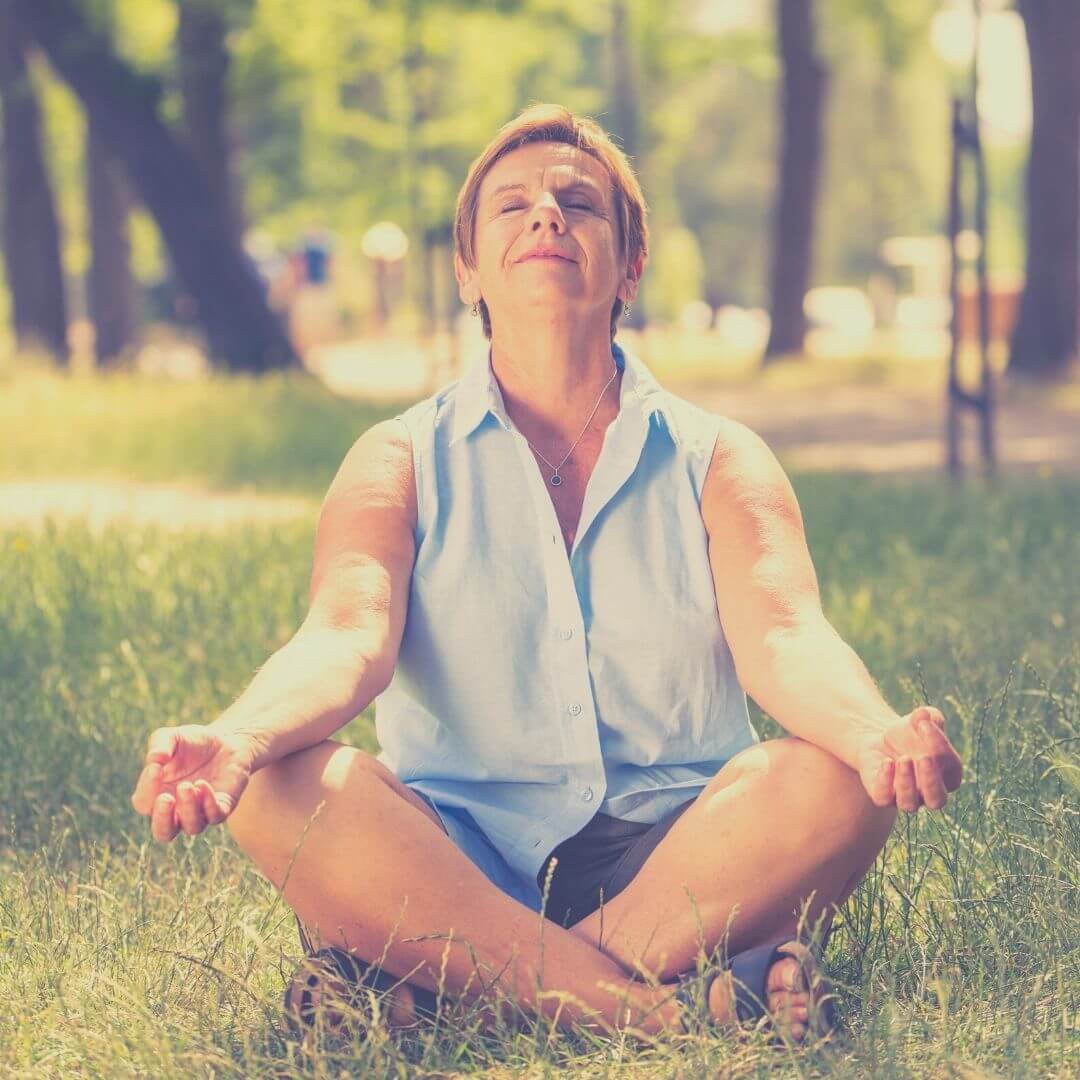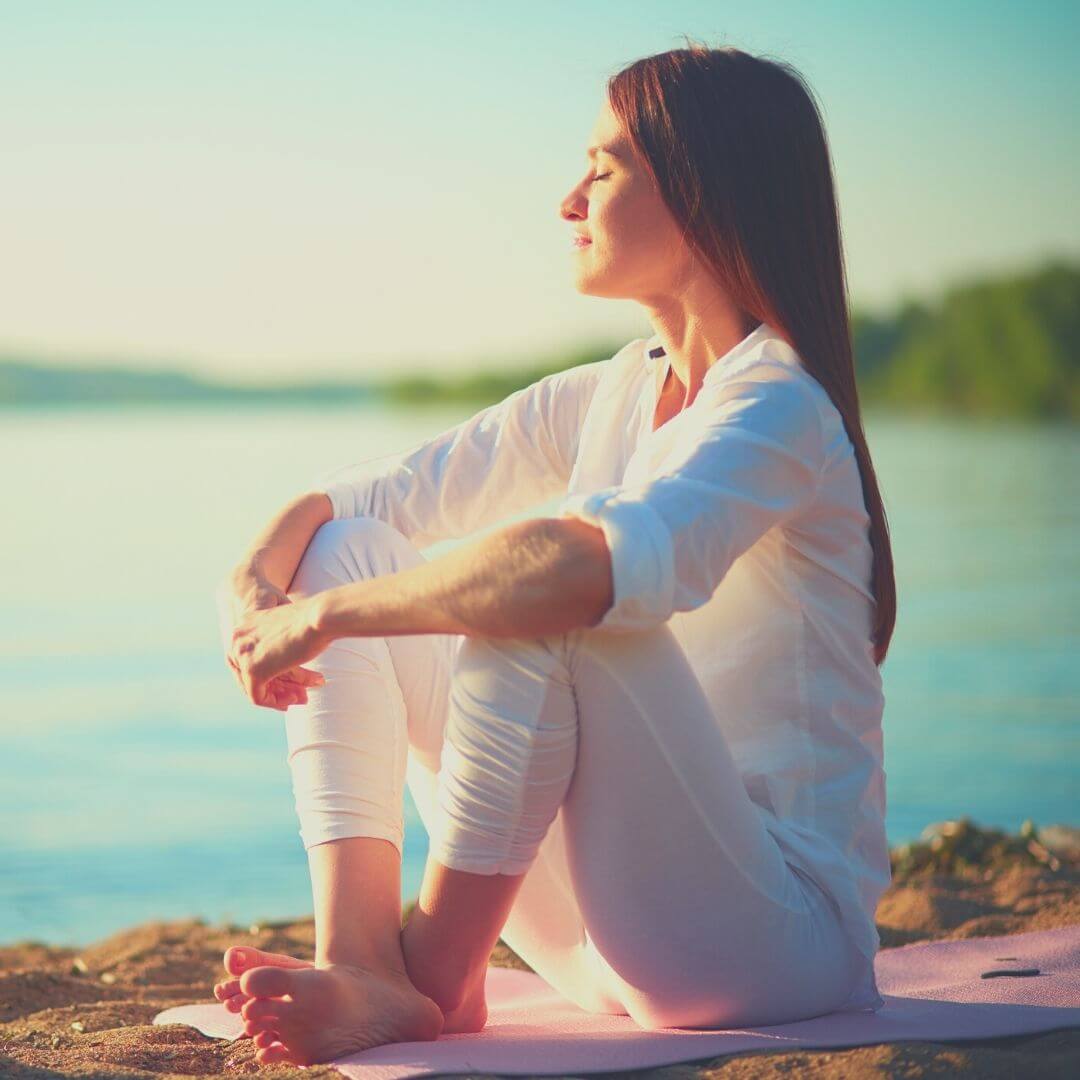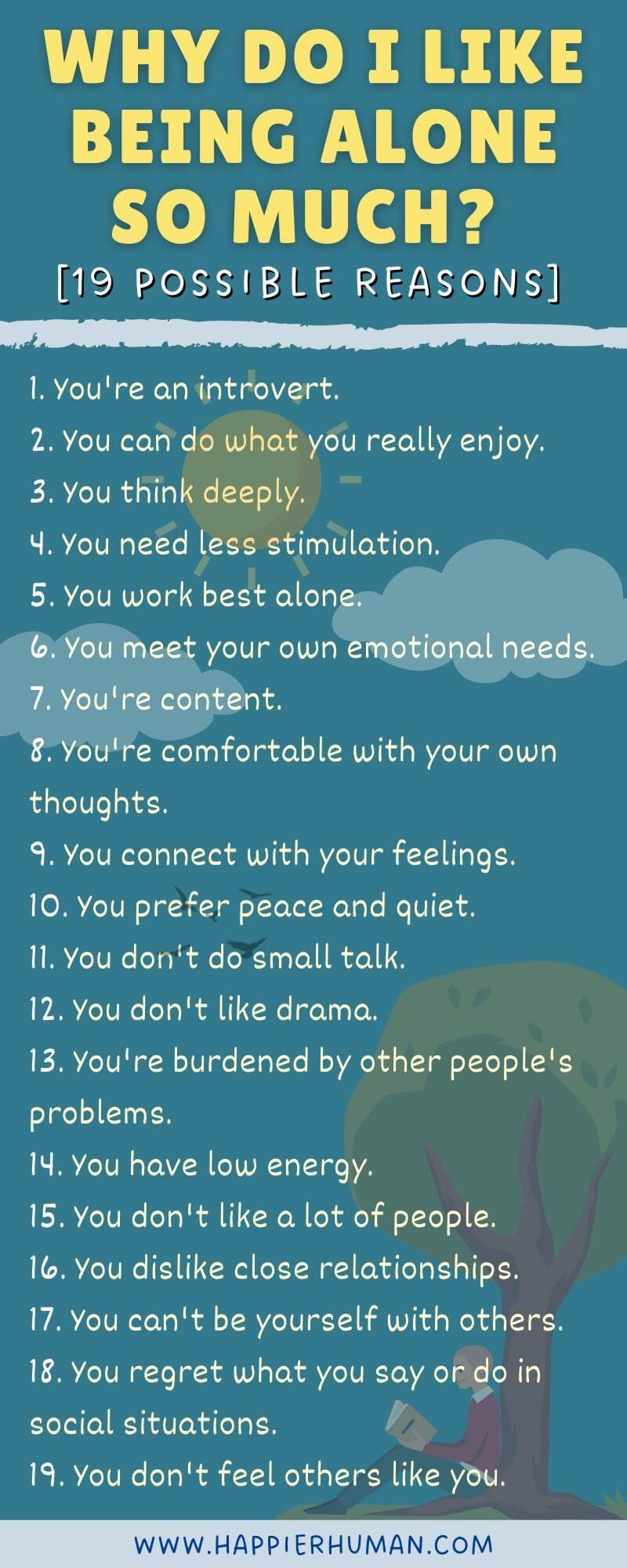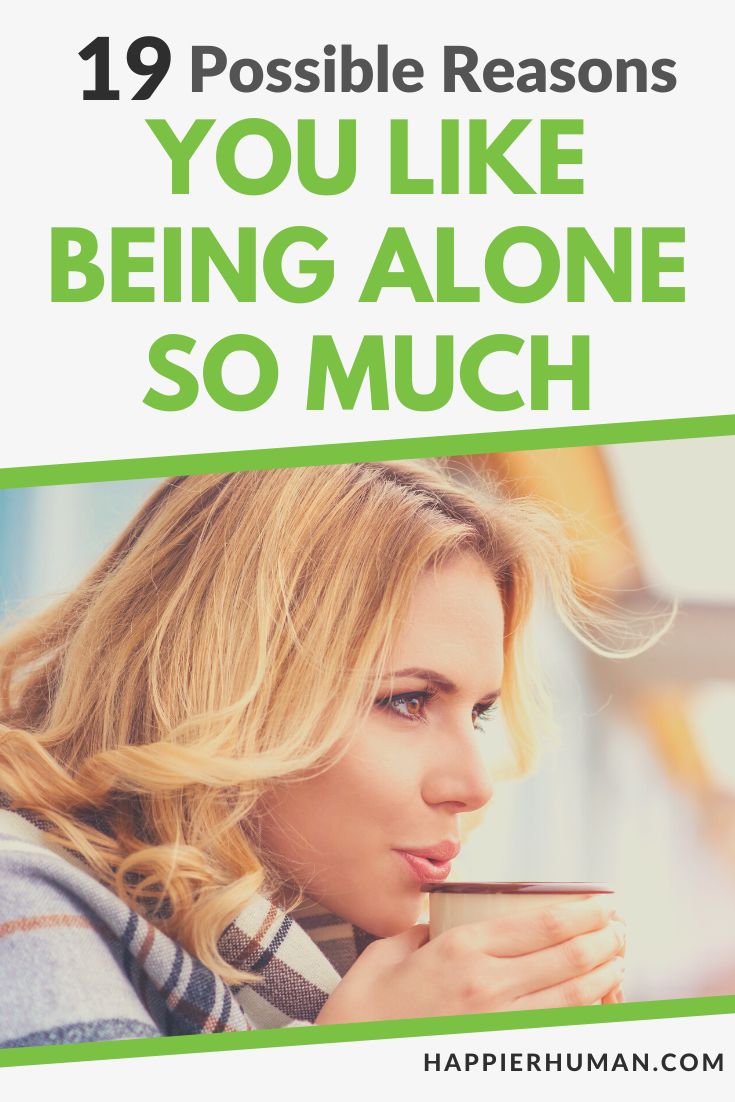Ever wonder to yourself, “Why do I like being alone so much?” When social and mainstream media show happy people… they’re usually with other people, not alone.
Although I’m content by myself, there are times when I don't want to be alone. This ambivalence and the contrast between my life and media images sent me searching for answers, which I’ll share with you here.
In this post, I will talk about the importance of understanding why you like being alone – positive and negative reasons, and tips to mitigate the negative ones.
Why Do I Like Being Alone?
I'm sure we all have times when we want to be by ourselves. Some of us want to be alone more than others. Some of us are alone more often than we want to be.
Others have families and jobs that keep them too busy for time alone, and would love to sneak a few moments to themselves.
When you choose to be alone for positive reasons, it can be a very positive experience. It promotes self-growth, as it can help you figure out who you are by giving you time to process your feelings.
Being alone can provide you with the quiet space to think deeply about things and allow you the stillness to plan for the life you want.
But if you're not alone by choice, or if you're alone because you feel inadequate around others, self-conscious or are avoiding something, it can be problematic and unhealthy.
It's important to know why you want to be alone. It can help you make the best of that time and appreciate this self-quality. Or, if you're alone for negative reasons, it can help you address things in your life that may need to be changed.
This PsychologyToday article discusses positive and negative reasons people want to be alone. Although the research cited in the post was conducted on teens and young adults, I think it's age-universal.
According to the article, people who are alone for negative reasons tend to experience more loneliness, depression, and anxiety than those alone for positive reasons.
Use your time alone to identify your feelings about being by yourself. Practicing mindfulness and keeping a journal is a great way to help you figure out why you like being alone.
Hone in on what you're feeling at the moment. Are you content, sad, lonely? Are you feeling rejected, empowered, spiritual and getting closer to your purpose in life?
Remember that mindfulness is accepting what you're feeling without judgement. Don't try and justify or understand it right now. Just write it down.
Now comes the real work. After you get your feelings down, if they're negative, try and remember what may have immediately preceded your wanting to be alone.
Was it something someone said or did that made you feel left out? Did you suddenly feel overwhelmed with nervousness and an impending sense of dread while in a social situation?
Negative reasons for being alone may indicate it's time to seek out a mental health professional or program.
After all, you wouldn't hesitate to contact a doctor if you had a persistent headache or other physical symptoms that interfered with your life, would you? Think of mental health the same way.
19 Possible Reasons You Like Being Alone
I've arranged these from positive, to 50/50, to negative reasons.
The Positives
1. You're an introvert.
An introvert's brain responds to stimuli differently than an extrovert's brain. You're at your best or feel healthiest when you're alone because this is how you recharge and replenish.
So, it makes sense that you would spend a lot of time by yourself. We all want to feel healthy, refreshed, and at our best.
2. You can do what you really enjoy.
When you're with others you have to compromise. While this may be okay sometimes, you usually end up doing what others want to do instead of what you really prefer.
When you're alone, you enjoy yourself more because you're involved in activities that truly make you happy.
3. You think deeply.
You like to ponder the meaning of life or some other philosophical ideology. Maybe you like to really focus and think about your goals, or reflect on your past and how you can use it as a lesson to make better choices for your future.

The business of others, or just their presence, interrupts your energy and vibe. All of that introspection you so joyfully and naturally engage in happens in a more controlled environment.
4. You need less stimulation.
Where the extrovert feeds on constantly being around people, you don't need to be surrounded by a crowd to feel energized and satisfied. It's overstimulation.
You're rewarded differently. Your rewards and fuel come from a good book or other self-care activities alone, or with your small group of loved ones.
5. You work best alone.
We spend most of our lives at work or working. If you do your best work alone, of course you want solitude most of the time.
Maybe it allows you to focus better or be creative. The interruptions from others, or just their existence in your space, may disrupt your natural flow of productive energy.
6. You meet your own emotional needs.
You get validation, acceptance, and love from yourself. You don't rely on or feel you need it from others to feel content.
7. You're content.
You're happy with your life as it is, and you're not looking to add more people or material things. You don't have a fear of missing out on something. You feel you have what you need already, or you feel you can give it to yourself.
It's easier to be alone when you're not looking for the gratification that can come from the attention of others, or other rewards social interactions may provide.
50/50
8. You're comfortable with your own thoughts.
You're okay with your feelings and thoughts. You don't need to shut them out or suppress them with the distractions of other people's chatter, thoughts, or lives.
9. You connect with your feelings.
Being alone helps you understand and appreciate yourself. It helps you process your life — past, present, and what you hope to be your future.
You can think through problems. Being alone helps you grow and evolve into a better person, which, in turn, helps you be a better friend or presence in someone else's life.
10. You prefer peace and quiet.
You may be overwhelmed or overstimulated by the company of others. Being alone with your own thoughts, or doing activities that bring you a sense of physical or mental calmness, is how you refuel and feel like your best self.
11. You don't do small talk.
You're just deeper than that. You enjoy meaningful conversations and see no reason to talk just to be heard.

You're sincere. When you ask a question or converse, you're really interested in what the other person has to say. And, of course, you want the same thing in return.
12. You don't like drama.
Gossiping, talking behind someone's back, and stirring up trouble are not your things. You have no tolerance for the toxicity that comes from causing a problem where none has to exist.
Because you don't get off on any of this, you avoid possible situations where drama can occur. And you definitely avoid the people who create the drama in the first place.
The Negatives
13. You're burdened by other people's problems.
You feel other people's problems too much. It weighs you down and makes you feel exhausted to hear about them. You feel drained when you try and help others work through or solve their issues.
This may be because you're very empathetic, or you're an empath, and you can't really separate others' feelings from your own. As a result, you internalize their negative feelings.
14. You have low energy.
Social interactions drain you. You don't have the endless supply that some people appear to have. You may feel the need to rest or do something calm and peaceful after social or physical stimulation.
This may just be how you're wired, and you're perfectly healthy. Or, it may be because of an underlying physical health problem or mental or emotional issues.
If you think it's the latter, you can do some self-reflection. Start a journal and track your energy throughout the day. Document the time of day, feelings, and situations that correspond with your different energy levels.
If you notice a concerning pattern (for example, depression can cause low energy), contact a medical or mental health professional.
If you don't feel or see any troubling indicators that it's related to health concerns, just continue to relax. Different strokes for different folks.
There are numerous reasons why you might feel tired all the time. So watch this video to see if any of these reasons sound familiar.
15. You don't like a lot of people.
You feel like most people aren't worth getting to know. This could be for positive or negative reasons. You may think most people are not on your intellectual level.
Their interests and goals may seem superficial. You'll get a kick out of this article that says you're alone because you're smarter than others.
On the other hand, you may have had bad experiences in the past and feel you can't trust people. Or, you may feel you just can't get past people's flaws and imperfections. Could your expectations be too high?
16. You dislike close relationships.
You may have close relationships, but with a select few, only letting so many people get to know you. You only feel comfortable being vulnerable with those you can really trust.
This keeps you safe. Your discernment has empowered you with “ride-or-die” confidants that you truly feel emotionally healthy with.
The flip side is that you may only let a few get close to you because you have a fear of intimate relationships. By intimate, I mean emotional intimacy. You fear you will be hurt or disappointed by others, so you don't give them a chance to get to know you.
Or, it's the opposite. You feel that you're not worth knowing, or that you won't live up to another person's expectations. You may feel that people will not want to be around you once they really get to know you, once you're vulnerable with them.
If you're alone for negative reasons, keep reading. At the end of this list, I give some tips on things you can do to change your situation.
17. You can't be yourself with others.
Your circle of companionship is small, and you may not socialize much, but you have people you can spend time with when you like to.

You feel more at ease when you're by yourself. The need to conform, or to behave or say what others find acceptable, makes you uncomfortable.
You'd rather be alone because that's when you can truly be yourself without judgement from others or the pressure to conform.
On the other hand, feeling like you can't be yourself may be linked to feelings of inadequacy, self-consciousness, or believing you're not good enough.
18. You regret what you say or do in social situations.
This may be a sign of social anxiety. It's a problem if it's negatively impacting your life and causing you unhappiness.
19. You don't feel others like you.
It's okay to enjoy your own company. But feeling left out or like others don't like you can lead to loneliness.
You may isolate for negative reasons because you have low self-esteem, past trauma, or negative past experiences. Maybe you were bullied or abused.
Emotional abuse or neglect is traumatic, too. Maybe you didn't get the love, acceptance, and validation you needed as a child to feel confident and worthy.
Negative reasons for being alone can lead to anxiety, stress, or depression, or may be caused by anxiety or depression.
If this, or any of the preceding negative reasons are why you are alone, it can be harmful to your happiness, mental health, and overall quality of life.
Talk to a loved one or co-worker you're close to. Find out from them all the lovable and likable things about you.
Sometimes we may feel like others don't like us because we've been taught we're unlovable. We've gotten the message somewhere in our lives that something is wrong with us.
Now is a good time to break this harmful, unfair self-perception. You may want to contact a mental health professional.
A counselor can help you work through these feelings, find out why you feel this way in the first place, and begin the healing that will help you see you are deserving of the level of companionship you desire. Here are some affirmations to begin the self-love process.
Whether it's to be with others constantly, like an extrovert, or to be alone, you deserve to have your choice.
Final Thoughts on Why I Like Being Alone
Hopefully, this article has enhanced your self-awareness and self-appreciation. Being alone can be a good thing, sometimes.
But if you're alone for negative reasons, I pray this article encourages you to make changes to improve your happiness.
Being alone at times can be beneficial for your mental well-being and a great practice of self-care. There is nothing wrong with “me time”. In fact, try making yourself laugh the next time you’re alone.
Read a good book, watch a movie or listen to a podcast! Laughter can make time alone happier and healthier, as it releases mood-boosting chemicals.
Don’t believe me? Check out these articles guaranteed to bring your to tears. Don’t worry, I’m talking about the good kind.
- 27 Funny and Comedy Podcasts to Listen To
- 50 Funny Affirmations for a Daily Dose of Humor
- 42 Funny Memes About Dealing with Work Stress
Or check out some of our other articles about being alone (and being happy):
- 11 Ways to Be Happy Alone and Single
- 13 Common Traits of People That Like to Be Alone
- 9 Benefits of Being Alone & Doing Things on Your Own
Finally, if you want to increase your happiness and life satisfaction, then watch this free video that details the 7-minute habit for planning your day to focus on what's important.


